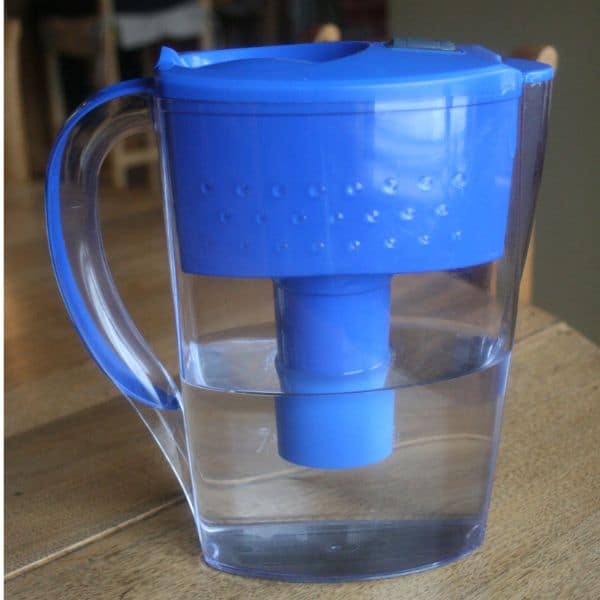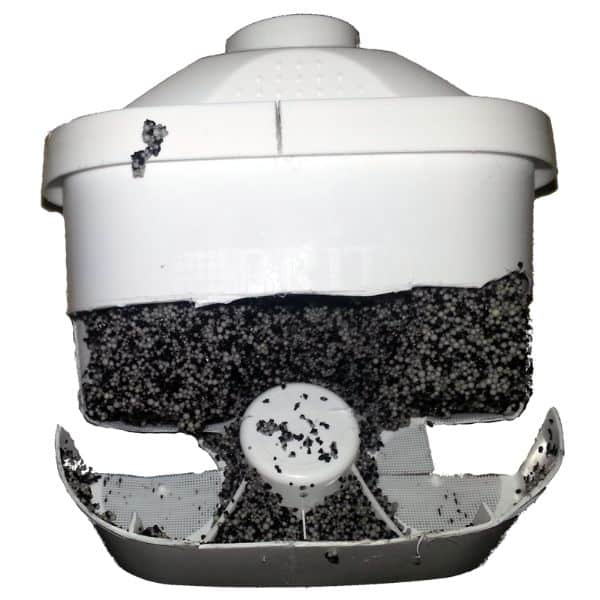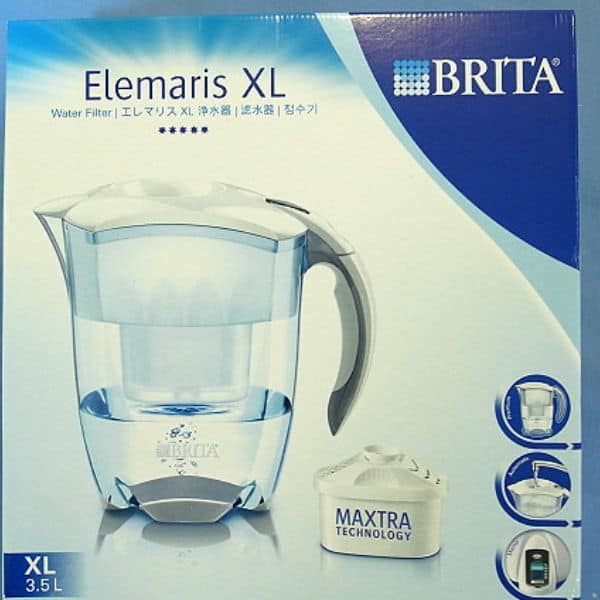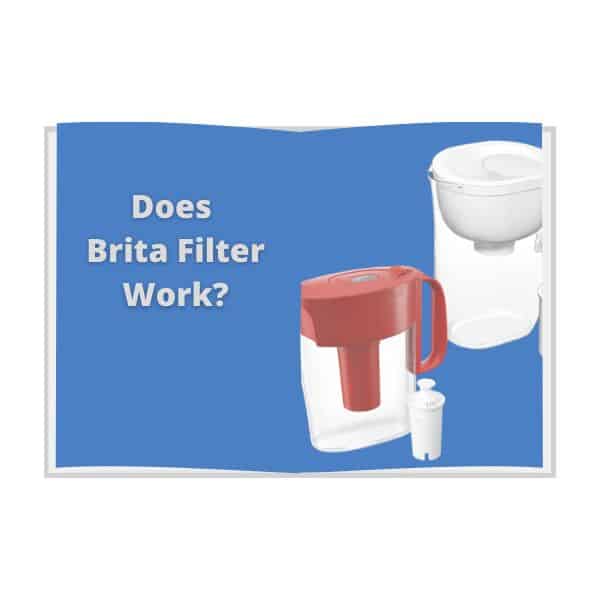What Are Brita Filters and How Do They Work?
At their core, Brita filtered water systems use activated carbon with ion exchange resin as their filter media. It effectively reduces heavy metals such as copper, cadmium, mercury, and chlorine taste and odor.
It’s worth mentioning that the Brita filtered water system is not designed to purify water so homeowners are advised not to use untreated water sources as they may contain microbes that can harm one’s health.
So, how does Brita filter your water? The water source first enters through the mesh screen in its BPA-free housing. Then, it flows through the activated carbon granules acting like a sponge to bring down the mercury content as well as remove chlorine taste and odor. The ion exchange resin also filters other heavy metals such as cadmium, copper, and zinc.

With its pleated filter media, Brita Elite filters are designed to last longer compared to Brita Standard filters. It also filters more contaminants like asbestos, VOCs, pesticides, and pharmaceutical residues.
While Brita Elite filters remove harmful water contaminants, they keep a healthy amount of fluoride required for strong teeth.
What Contaminants Do Brita Filters Remove or Reduce?
Following are the contaminants that a best water filter pitcher like Brita filters can remove from your source water.
Brita Standard
Brita Standard Filters fit with all Brita pitchers and dispensers and are designed to reduce common water contaminants such as copper, zinc, and cadmium and remove chlorine taste and odor. Thanks to its filter combination of carbon-activated filter and ion exchange resin that does the job efficiently.
Elite Filter (Longlast Filter)
Brita Elite Filter lasts three times longer than the Standard filter and removes the widest range of contaminants from tap water. Aside from heavy metals such as lead, mercury, and cadmium, Brita Elite filters also remove the following water contaminants:
- Asbestos
- Pesticides and Herbicides (e.g. Atrazine, Endrin)
- Pharmaceutical residues (e.g. Atenolol, Ibuprofen, Naproxen)
- Volatile organic compounds (e.g. Benzene, p-Dichlorobenzene (PDCB)
- Sediments (particulates of 0.5 to 1 micron)
The Brita Elite filter with its mercury-reducing ability works with Ultramax Jet Black (OB24), Space Saver (OB21), Grand Color Series (OB36), Pacifica (OB41), and Monterey (OB50).
The Elite Filter also improves the taste and odor of tap water by reducing levels of chlorine in drinking water. You can see the complete list of contaminants here.

Stream Filter
The activated-carbon-based Brita Stream Filter features filter-as-you-pour technology that removes contaminants as you pour your source water. This means you get to enjoy a refreshing drink more quickly.
Based on its performance data sheet, the Brita stream filter reduces a 1,2,4 Trichlorobenzene- a type of volatile organic compound (VOC), Particulate (Class VI) coarse particulates of more than 50 micrometers as well as reduces chlorine taste and odor.
As different types of Brita filters address a different number of contaminants, it is important to have your water tested. Doing so will help you determine what filter and model are best for your water filtration needs.
Why Replace Brita Filter Cartridge?
Brita filter cartridges are some of the most popular and widely used options. But why should you replace your Brita filter cartridge? Here are just a few reasons to make the switch:
- Replacing your cartridge helps ensure that your tap water is as clean and pure as possible. Over time, the filter can become clogged with sediment and other particles that cause it to be less effective in removing contaminants from water. By regularly changing out the cartridge, you can help keep the system running at its best.
- Additionally, regularly replacing your Brita filter will also help extend its lifespan. While these filters are designed for long-term use, they still need to be properly maintained in order to work optimally for many years.

When to Change Brita Filters?
When it comes to changing your Brita faucet filters, it is best to refer to the manufacturer’s guidelines. However, you should also consider the quality of your source water and water usage as these factors can affect the frequency of Brita filter replacement.
Depending on the type of filter you have in your home, the frequency at which you need to switch out may differ.
Elite Filter
It is important to make sure that Brita Elite Filters are changed on a regular basis. To ensure optimal performance, it is recommended that the filter be changed every 6 months or if it has already filtered 120 gallons or 454 liters of water. Changing your Brita Elite Filter helps keep contaminants from building up in your system over time.
Standard Filter
To get the most out of your Standard Brita filter, it is recommended that you replace it every two months or after filtering 40 gallons or 151 liters of water. The indicator light on the pitcher can help remind you when it’s time for a new filter.
When this light turns yellow, there are still some uses left in the current filter before it needs replacing; however, if the light turns red, then it’s definitely time for a new one!
Stream Filter
Brita recommends changing the filter every 40 gallons or about two months of use. To keep track of how often you should replace your filter, consider using your built-in electronic filter indicator.

Signs That Your Brita Filter Needs Replacing Even Before the End of Its Life
If you’re like many people, you rely on a Brita pitcher to make sure your drinking water is healthy and safe. However, there are certain signs that can indicate it’s time to replace your filter even before the end of its service life.
Here are some common signs that suggest it’s time for a new Brita filter:
Bad-tasting water
If your water starts tasting bad, it’s likely time for a new filter. This could mean that there may be bacteria growing inside the filter, which can contaminate and affect the taste of your water. Additionally, if your water takes longer than usual to filter through the pitcher or faucet attachment, it might mean that sediment has built up in the filter which will impede its ability to do its job properly.
Smelly water
If you start noticing an odd smell or taste in the water coming from your filter system – not just a slight difference from tap water but a foul odor or taste – that can be an indication that the filter needs replaced.
Additionally, if there’s visible dirt or debris in the filtered water this means that the filter is not catching all of these particles and should be changed.
Slow water flow
One telltale sign that your Brita filter needs replacing sooner rather than later is slow water flow. If it takes longer to fill your cup or pitcher with filtered water than normal, this could be an indication that your Brita isn’t working as efficiently anymore. If this is the case, it could be time to replace your filter cartridge.
Presence of mold or algae
The most obvious sign that it’s time to replace your Brita water filter pitcher is if any mold or algae has been detected in the water after filtering. Not only does this make for an unpleasant taste in the water, but can also be dangerous if ingested. If this happens, immediately remove and replace your current Brita filter as soon as possible.
How to Choose the Best Brita Filter For Your Needs?
When it comes to choosing the best Brita vs PUR for your needs, there are a few things you should consider.
Know the quality of your source water
The first step to choosing the best drinking water filtering system for your needs is knowing the quality of your source water. Depending on where you live, there could be different types of contaminants in your water supply including lead, chlorine, and other organic compounds. Understanding which type of impurities is present will help you determine which Brita filter is right for you.
Consider which filter remove which contaminant
The type of filter you use will depend on the types of contaminants you’re looking to remove from your water. Brita water filters come in a variety of options, ranging from basic activated carbon filters which can help reduce chlorine taste and odor, to advanced filters that address lead and asbestos.
Read unbiased reviews
When it comes to choosing the best Brita filter, doing your research and reading unbiased reviews can help you choose a water filter that will meet all of your needs.
If cost is a factor, online reviews can be helpful in finding user experiences with various Brita models so you can make sure that the one you select offers good value for your money.
Conclusion
Brita filters are an excellent choice for a home water filtration system. There are three types of Brita filters: Elite Filter, Standard Filter, and Stream Filter. Each filter type addresses a different number of water contaminants, so it’s important to first test your water for possible impurities.
While Brita filters may not be able to remove all contaminants from your water supply, they do reduce levels of dangerous contaminants that may be present in your source water.
Also, check out our Brita Filter review to learn more.

